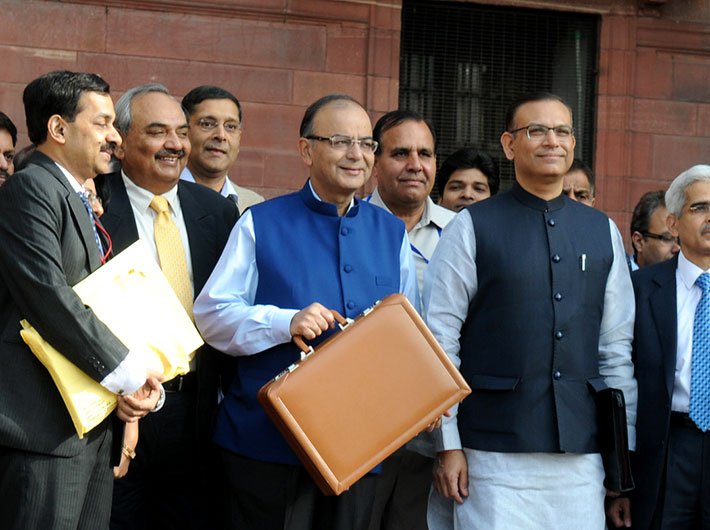At first glance, the budget seems an annual ritual that strictly follows the colonial legacy in letter and spirit. Rarely does any finance minister deviate from the atmospherics and settings that mark the presentation of the government’s economic agenda. Union finance minister Arun Jaitley truthfully emulated his predecessors.
His impeccable English combined with clever arguments was no less impressive than UPA finance minister P Chidambaram’s. Both are successful lawyers; the similarity in style is rather distinct. But it was expected that Jaitley will depart from the past – in a substantive and radical manner. That hope proved to be short-lived as Jaitley concluded his budget speech with an apparently political objective of forging a coalition of extremes. His budget tried to strike a delicate balance between protecting the interests of the affluent and extending the social security net to the marginalised.
That is a difficult job; it requires the skills of a magician. And there were all indications that the finance minister fell woefully short on winning a convincing argument. Though he produced certain innovative ideas like bringing unorganised sector workers under the insurance umbrella, he does not have a road map to attain this social objective. Similarly, his plan of bringing a large section of society under the accidental insurance cover of Rs 2 lakh may face insurmountable resistance in translating into action.
Another bold initiative pertained to making employees’ provident fund (EPF) optional and partial phasing out of employees’ state insurance (ESI). The ESI corporation, under the labour ministry, is a defunct institution originally meant to cater to healthcare needs of workers in the organised sector. In both cases, these service providers are often found working against workers’ interest.
But what is the alternative? There is little evidence that the alternative offered in both cases was thought through and was a viable option. For instance, replacing the ESI by providing insurance cover to workers would be a meaningless exercise unless a thriving and well-regulated healthcare system comes up in its place.
In the same way, the option of giving pension instead of depositing workers’ contribution in the EPF would be equally cumbersome if it does not take into account the uncertainty of the private job market.
The creation of the MUDRA bank to refinance micro-finance institutions is a laudable move. Yet, this is not the first time that an attempt is being made to revive rural and semi-urban economy by providing small loans to those struggling to come out of poverty. Given the experience of the integrated rural development programme (IRDP), undertaken on a large scale during the 1980s, it is yet to be ascertained whether Jaitley has learnt adequate lessons from history.
The massive funding of the IRDP through the regional rural banks (RRBs) spawned a large corruption racket involving bankers, block-level officers and middlemen. The fine print of the present scheme does not ensure such profligacy would not recur.
This budget can, perhaps, be best understood for its unambiguous approach towards the corporate sector. Besides reduction of corporate tax and devising a new public-private partnership (PPP) model (a euphemism for public funding of private profiteering), the economic policies are clearly enunciated in favour of big business. Once again, the ground for big growth of infrastructure is being laid at the expense of public money.
This will clearly facilitate the private sector to expand their business at minimum risk. The objective of turning certain urban pockets of India into world-class cities in terms of roads, airports and hotels easily fits into the NDA’s previous concept of ‘India Shining’. Though this slogan failed to yield political dividends in the past, the present rulers seem cocksure about its success now.
Jaitley’s attempt to forge a coalition of extremes may ultimately prove to be bad politics if his schemes for the poor do not translate into action on ground. His mannerism and wits as finance minister may have endeared him to the crème de la crème of society but they are lost on a silent majority which gave a clear mandate to the Modi-led NDA. The new government is set to tread the beaten path, and that would set off disaffection much sooner than expected.
ajay@governancenow.com
(The article appears in the March 16-31, 2015, issue)

